Google Ads Manager Accounts (MCC) 2024 Guide: How They Work and Why You Need One
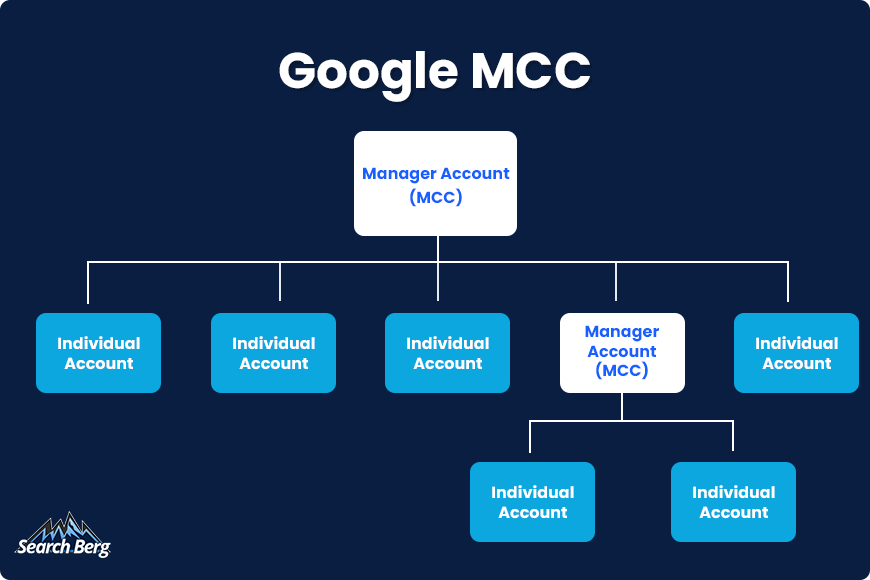
In the complex world of Google Ads, managing multiple accounts can quickly turn into a logistical nightmare. Scattered campaigns, inconsistent reporting, and missed opportunities drain your time and resources, leaving you feeling frustrated and overwhelmed.
Google Ads Manager Accounts (MCC) 2024 Guide: How They Work and Why You Need One
If you’re nodding your head in agreement, it’s time to discover the power of Google Ads manager accounts(MCCs). An MCC is a centralized command center that brings order to the chaos by helping you streamline your advertising efforts and achieve better results. It’s a powerful tool in the Google Ads management arsenal.
This comprehensive guide is your roadmap to MCC mastery. We’ll break down the complexities of MCC, explaining its features, benefits, and best practices in a clear and actionable way. You’ll learn how to consolidate billing, access cross-account insights, optimize campaigns at scale, and make data-driven decisions that drive real business growth.
Say goodbye to the headaches of fragmented Google Ads management. With an MCC, you’ll gain the clarity, efficiency, and control you need to take your advertising to the next level.
Let’s get started!
What is a Google Ads Manager Account?
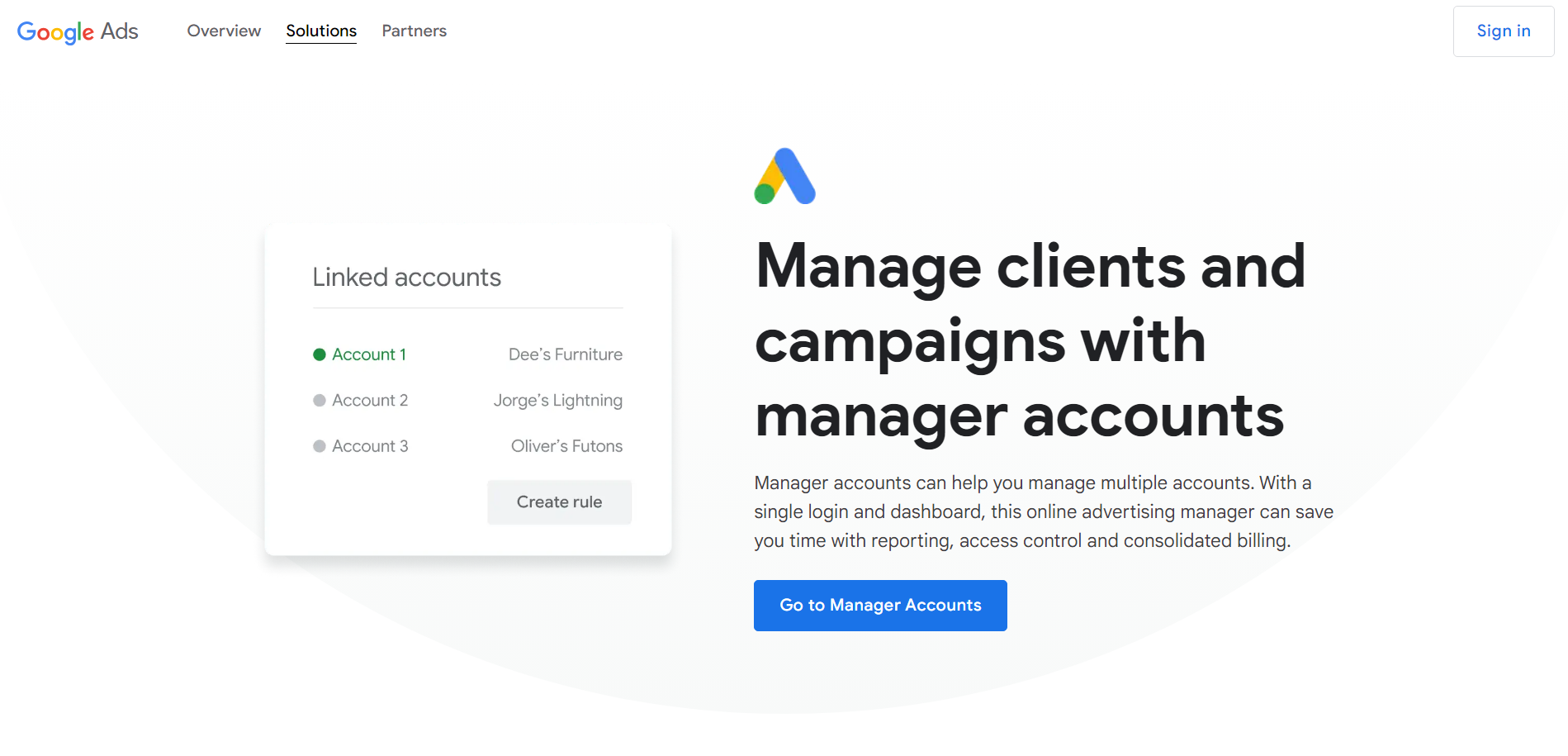
At its core, an MCC is a special type of Google Ads account designed to manage multiple individual Google Ads accounts (referred to as “child accounts”). It acts as a parent account, providing a centralized hub for managing campaigns, budgets, reporting, and more across all linked accounts.
The Anatomy of an MCC
An MCC functions like a well-organized filing cabinet for your Google Ads endeavors.
Here’s a breakdown of its key components:
- Parent Account: This is the main Google Ads manager account, where you’ll access and manage all your child accounts.
- Child Accounts: These are the individual Google Ads accounts linked to your Google MCC. They can represent different businesses, brands, or campaigns.
- Dashboard: The MCC dashboard provides a comprehensive overview of all your child accounts, with key metrics and performance data at your fingertips.
- Tools and Features: The MCC offers a range of powerful tools and features to streamline your advertising efforts, including consolidated billing, cross-account reporting, automated rules, and more.
The Power of Centralization
The true beauty of a Google Ads manager account lies in its ability to centralize your Google Ads management. No more logging in and out of multiple accounts, manually pulling data, or struggling to maintain consistency across campaigns. With an MCC, you gain a bird’s-eye view of your entire advertising jungle. This means you can make informed decisions and optimize performance at scale.
Imagine having a master control panel where you can monitor the performance of all your campaigns, across different accounts, with just a few clicks. You can quickly identify which campaigns are performing well and which ones need attention, allowing you to allocate your budget more effectively and maximize your ROI.
A Google Ads MCC also eliminates the tedious task of manually consolidating data from multiple accounts. With cross-account reporting, you can generate comprehensive reports that aggregate data from all your child accounts, giving you a holistic view of your advertising performance. This enables you to identify trends, compare performance across different accounts or campaigns, and make data-driven decisions that fuel your overall strategy.
Sweet, right?
Consistency is another key benefit of centralization. With a Google MMC account, you can easily ensure that your branding, messaging, and ad creatives remain consistent across all your accounts. This helps to build a strong brand identity and avoid confusion among your target audience.
Who Benefits from an MCC?
MCCs offer immense value for businesses of all sizes and industries.
Here are a few examples:
- Multi-Brand Businesses: If your company oversees multiple brands or product lines, each with its unique target audience and marketing goals, a Google Ads manager account becomes your organizational lifeline. Manage campaigns for each brand under one roof, ensuring consistency in messaging and branding while tailoring strategies to specific audiences. You don’t have to worry about juggling logins or duplicating efforts; an MCC keeps everything harmoniously in sync.
- eCommerce Stores: For online retailers, the ability to track and analyze campaign performance across various product categories or target demographics is imperative. A Google Ads manager account transforms into your analytical powerhouse, offering granular insights into which products are resonating with which audiences. This knowledge can help you optimize your ad spend, refine targeting, and boost your ROI.
- Solopreneurs and Small Businesses: Don’t let limited resources hinder your Google Ads potential. A manager account levels the playing field, providing a user-friendly platform to manage multiple campaigns without getting lost in the weeds. You can save precious time by consolidating tasks, streamlining reporting, and focusing on what matters most: growing your business with the consistency it deserves.
Recommended Read: How Google Ad Manager Can Transform Your Small Business
How Does a Google Ads Manager Account Work?
Now that we’ve established the “what” of MCCs, let’s dive into the “how.”
Step 1: Creating Your MCC
If you don’t already have an MCC, the first step is to create one.
Here’s a breakdown of the process:
- Visit the Google Ads website: Navigate to the official Google Ads website and sign in using your Google account credentials.
- Access Manager Accounts: Once logged in, locate the tools icon in the top right corner of the screen. It’s represented by a wrench or gear symbol. Click on this icon to reveal a dropdown menu. From the menu, select the option labeled “Manager Accounts.”
- Initiate the Creation Process: You’ll now be on the Manager Accounts page. Here, you’ll see a prominent blue plus button. Click on this button to start the MCC creation process. From the options presented, select “Create a Manager Account.”
- Provide Account Details: Google will then guide you through a series of prompts to gather essential information about your Google Ads manager account. You’ll need to provide the following:
- Account Name: Choose a descriptive name that reflects the purpose of your MCC (e.g., “My Agency MCC” or “My Business MCC”).
- Primary Account Use: Select whether you’ll primarily use the MCC to manage your accounts or to manage client accounts.
- Country, Time Zone, and Currency: Specify your location, time zone, and the currency you’ll use for billing.
- Complete the Setup: Once you’ve filled in all the required details, click on “Create Account” or a similar button to finalize the process. Google will then generate your new Google Ads manager account.
- Explore Your Dashboard: After successful creation, you’ll be greeted with a welcome message and an option to “Explore Your Account.” Click on this to access your freshly minted MCC dashboard.
Remember:
- You can only create one MCC per Google account. If you want to manage multiple MCCs, you’ll have to use separate Google accounts.
- The information you provide during the setup process is important, as it will impact how your MCC functions and how you’re billed.
The Google MCC dashboard is your central command center for managing all your linked accounts. It’s designed to provide a comprehensive overview and easy access to essential tools and features.
Let’s take a closer look at its key components:
- Performance Summary
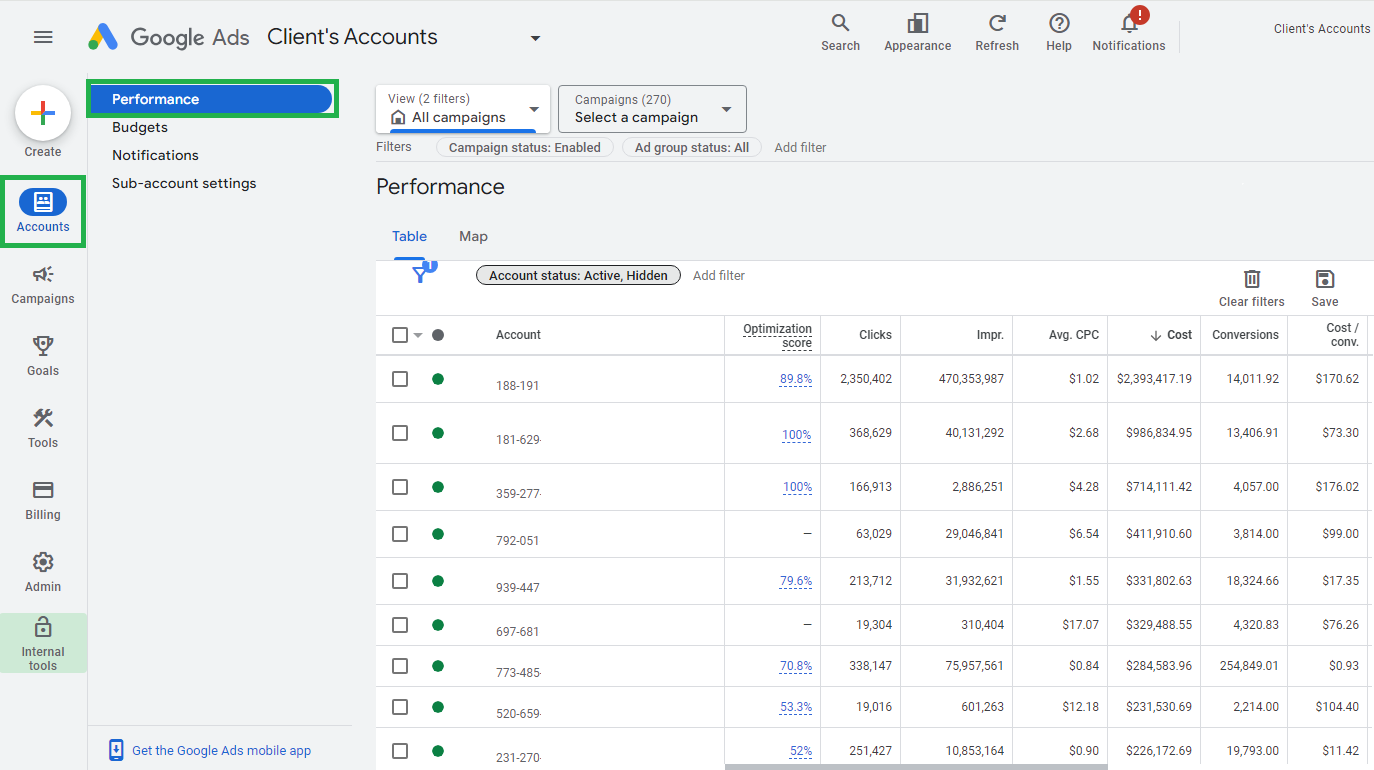
This section offers a bird’s-eye view of your overall advertising performance. You’ll find key metrics like clicks, impressions, conversions, and cost aggregated across all your child accounts. This snapshot helps you quickly gauge the effectiveness of your campaigns and identify areas for improvement.
- Recommendations
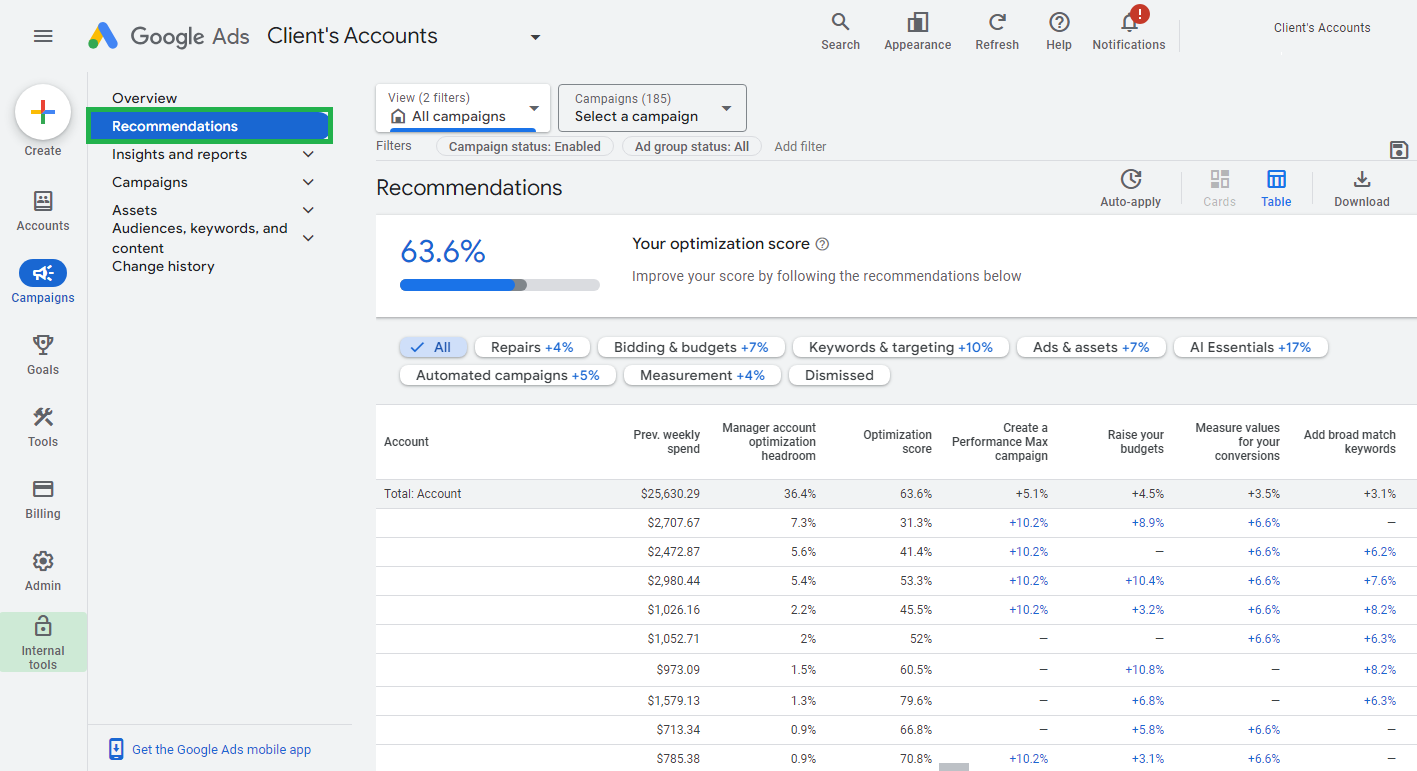
Google Ads is constantly evolving, and the MCC dashboard keeps you ahead of the curve. The “Recommendations” tab provides personalized suggestions based on your account’s performance and industry trends. These recommendations can range from keyword optimizations to bid adjustments, helping you refine your strategies and achieve better results.
- Reports
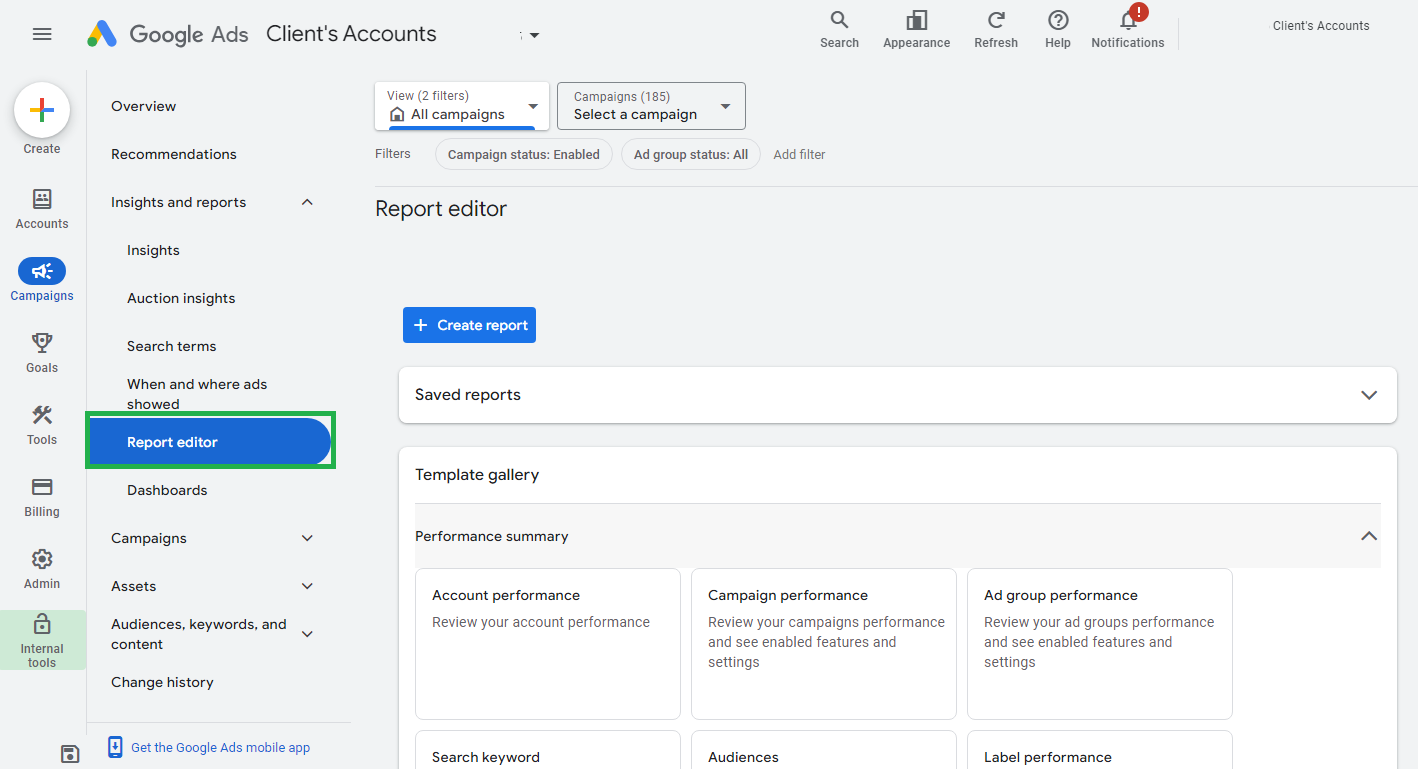
Data is the lifeblood of successful advertising, and the Google MCC dashboard delivers. You can access a vast array of reports, including cross-account reports that aggregate data from all your child accounts. This allows you to compare performance across different campaigns, identify trends, and uncover valuable insights that inform your decision-making.
- Tools
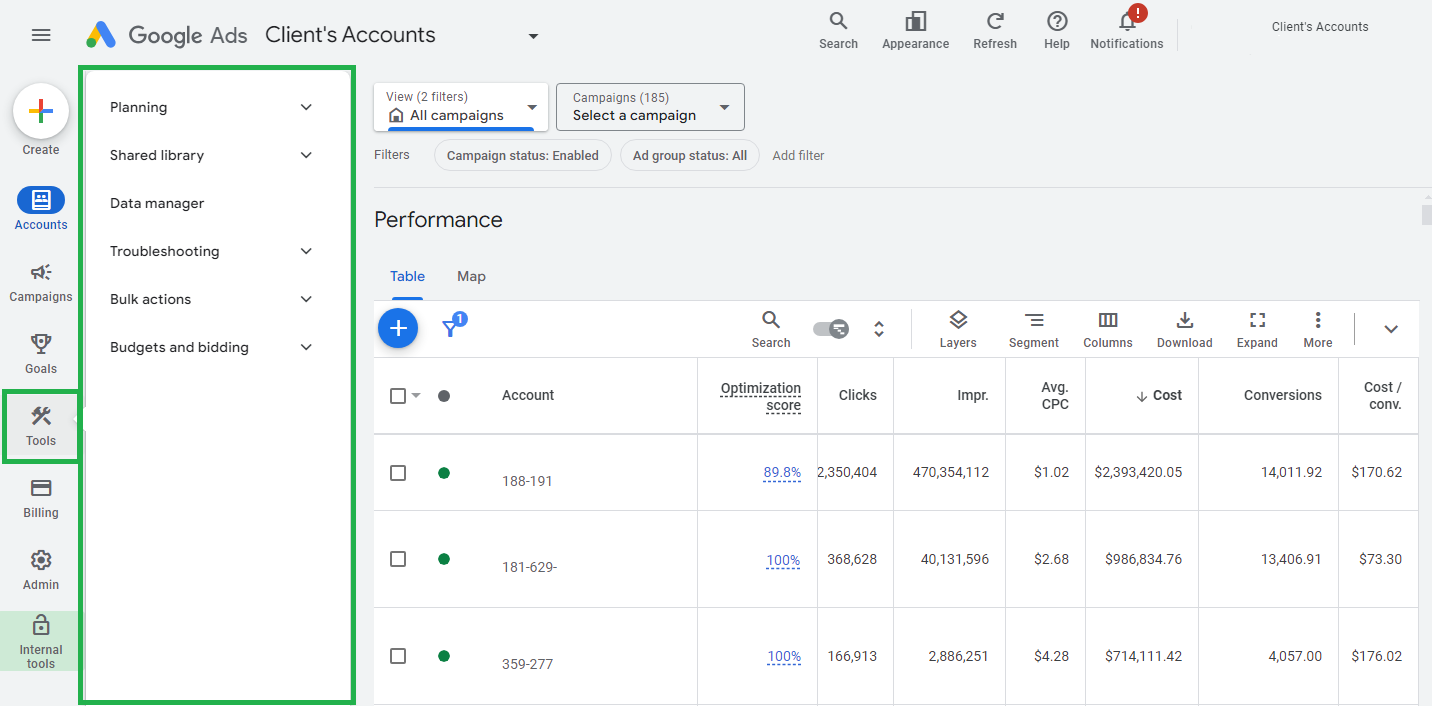
Google Ads manager accounts are packed with tools to streamline your workflow and boost efficiency. Automated rules let you set up actions that trigger based on specific conditions, saving you time on manual tasks. Shared budgets enable you to allocate resources across multiple campaigns, ensuring optimal spending. And shared assets, e.g., remarketing lists and ad extensions, promote consistency and eliminate redundancy.
- Navigation & Account Management
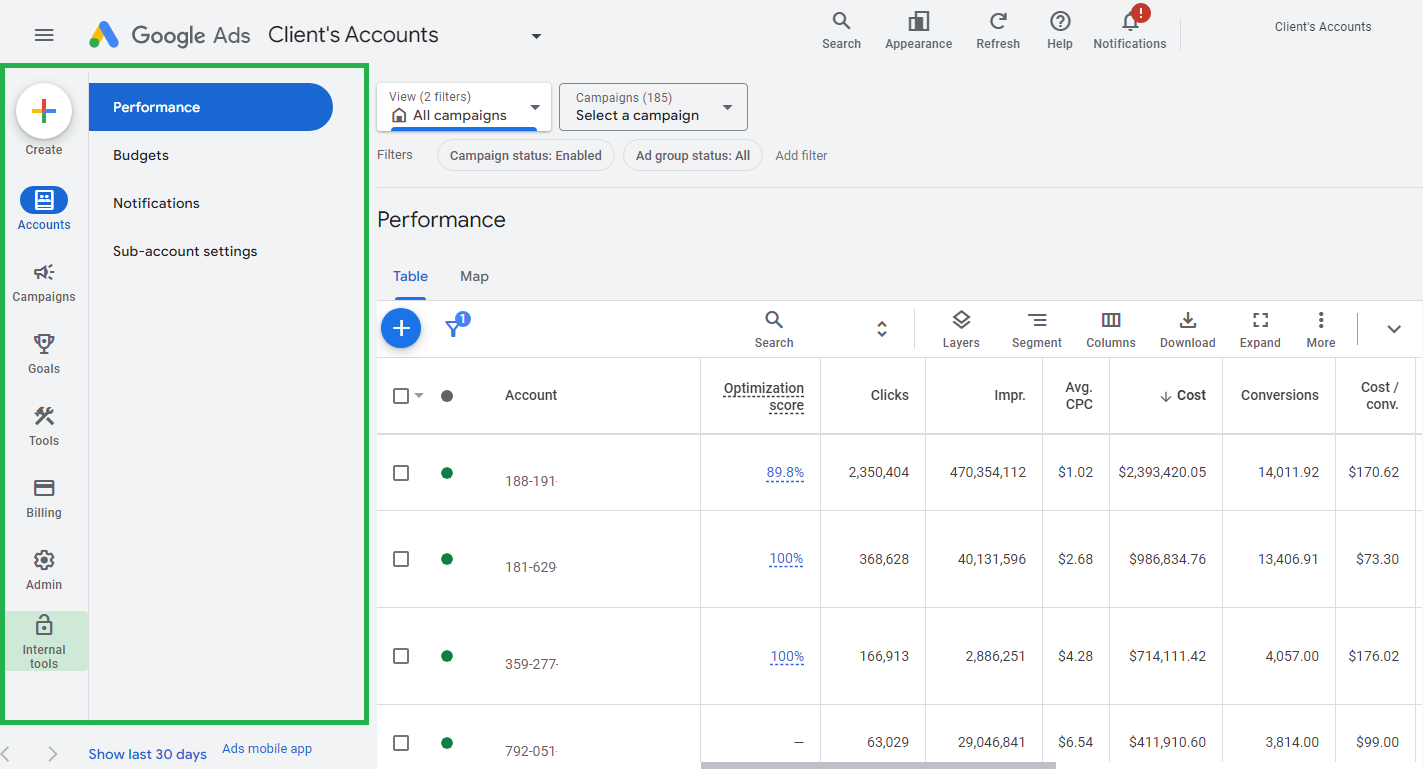
The left-hand navigation menu provides easy access to different sections of your MCC, including campaigns, ad groups, keywords, and more. You can also manage user access and permissions for each child account, ensuring data security and collaboration.
While the MCC Ads dashboard serves as your advertising nerve center, it’s not for the faint-hearted. Its labyrinth of features and data can be overwhelming for the uninitiated. However, in the hands of a skilled Google Ads management professional, this dashboard transforms into a goldmine of insights and optimization opportunities.
Think of it like a high-performance race car: incredibly powerful, but requiring expertise to handle its full potential.
A seasoned Google Ads service provider can:
- Work through the wealth of cross-account reporting data to pinpoint strengths, weaknesses, and areas for improvement.
- Master the art of automated rules to fine-tune campaigns in real-time, ensuring optimal performance around the clock.
- Leverage shared budgets and shared assets to maximize efficiency and maintain consistency across all your Google Ads accounts.
- Stay abreast of the latest Google Ads updates, adapting your strategies to stay ahead of the competition.
If you’re feeling overwhelmed by the complexities of the MCC dashboard, or simply want to ensure your Google Ads maintenance is in expert hands, turn to Search Berg. We’ll take the reins and help you tap into Google Ads mastery.
Step 3: Managing Your Campaigns
Smart, efficient campaign management is non-negotiable. Here’s a breakdown of how you can wield the MCC dashboard’s power:
- Campaign Creation and Editing: The MCC interface lets you create new campaigns or seamlessly edit existing ones across multiple accounts. You can adjust campaign settings, target new keywords, modify ad copy, and refine targeting parameters, all without leaving the comfort of your MCC dashboard.
- Bid and Budget Management: Say goodbye to the tedious task of logging in and out of each account to adjust bids and budgets. With your Google Ads manager account, you can make real-time changes across multiple campaigns or accounts, ensuring optimal spending and maximizing your return on investment.
- Performance Tracking and Analysis: With cross-account reporting at your fingertips, you can track performance metrics across all your campaigns in one convenient location. This enables you to identify top-performing campaigns, find areas for improvement, and make data-driven decisions to optimize your overall advertising strategy.
- Ad Group and Keyword Management: Dive deeper into your campaigns and manage ad groups and keywords across multiple accounts. You can add new keywords, adjust match types, refine ad group settings, and experiment with different ad variations to improve your click-through rates and conversion rates.
- Ad Extension Management: Enhance your ads with eye-catching extensions like sitelinks, callouts, and structured snippets. The MCC allows you to create and manage ad extensions across multiple accounts.
- Device and Location Targeting: Tailor your campaigns to reach the right audience at the right time. With a Google Ads manager account, you can easily adjust device and location targeting settings across multiple accounts.
- Experimentation and Optimization: A/B testing and experimentation are essential for continuous improvement. The MCC facilitates this process, allowing you to run experiments across multiple accounts, compare results, and implement winning strategies.
Recommended Read: How to Find the Right Keywords for Google Ads
Step 4: Leveraging Cross-Account Insights
One of the most powerful benefits of a Google MCC is its ability to aggregate and analyze data across all your linked accounts, providing invaluable cross-account insights.
Instead of sifting through individual account reports, you gain a holistic view of your advertising performance. As a result, you can make informed, data-driven decisions that benefit your entire strategy.
- Finding Hidden Trends and Patterns
With cross-account reporting, you can spot trends and patterns that may be hidden when looking at individual accounts in isolation.For instance, you may notice that a particular ad format performs exceptionally well across multiple accounts, or that certain keywords consistently drive higher conversions.
These insights can help you double down on successful strategies and refine your approach for maximum impact.
- Comparing Performance and Identifying Opportunities
A Google Ads manager account enables you to compare the performance of different accounts or campaigns side-by-side. This helps you identify top performers, find areas for improvement, and pinpoint opportunities for optimization.
For example, you may discover that one account has a significantly higher click-through rate than others, prompting you to investigate its ad copy or targeting strategies and apply those learnings across other accounts.
- Making Data-Driven Decisions
Armed with cross-account insights, you can make informed decisions that align with your overall business goals. Whether it’s reallocating budgets to high-performing campaigns, testing new ad formats, or refining your target audience, the data enables you to make strategic choices that drive results.
Here are some specific examples of how cross-account insights can be utilized:
- Identifying top-performing keywords across all accounts.
- Comparing conversion rates for different ad groups or campaigns.
- Analyzing the impact of different bidding strategies or ad extensions.
- Uncovering audience segments that respond well to your ads.
- Tracking the performance of seasonal or promotional campaigns.
By leveraging the cross-account insights provided by your MCC, you can transform Google Ads management from a reactive process to a proactive one. You’ll be able to anticipate trends, identify opportunities, and make strategic decisions that maximize your advertising ROI.
Step 5: Automating Tasks and Optimizing Performance

In the fast-paced jungle of Google Ads, where every second counts, manual adjustments and constant monitoring can quickly become a bottleneck. Google MCCs address this challenge head-on, offering a suite of automation tools that transform your approach to campaign management.
Think of it as having a team of tireless digital assistants working behind the scenes, continuously optimizing your campaigns based on predefined rules and triggers. These automated rules enable you to set specific conditions, e.g., a target cost-per-acquisition (CPA), a desired click-through rate (CTR), or even a specific time of day, and let the system take action automatically.
For instance, imagine a scenario where a particular keyword starts racking up clicks without generating conversions. Instead of manually monitoring this and pausing the keyword, an automated rule can be set to do it for you, saving you valuable time and preventing wasted ad spend. Similarly, you can create rules to automatically increase bids on high-performing keywords or adjust budgets based on overall campaign performance.
But automation doesn’t stop at rules. Google MCCs also allow for the implementation of scripts, which are essentially snippets of code that automate complex tasks or reporting. This can be particularly useful for large businesses managing numerous campaigns, as scripts can save countless hours of manual work and provide granular insights into performance data.
Beyond that, Google’s Smart Bidding strategies integrate seamlessly with MCCs, allowing you to leverage machine learning algorithms to optimize bids in realtime. By analyzing a vast array of signals, these strategies can help you achieve your performance goals more efficiently and effectively.
Automation within Google MCC unlocks a whole new level of agility and optimization. When this feature falls into the hands of a capable, experienced Google Ads management team, you’re looking at a powerful synergy that can significantly boost your advertising performance.
Step 6: Monitoring and Refining
The digital advertising terrain is anything but even. Consumer behavior shifts, market trends evolve, and competitors adapt their strategies. That’s why ongoing monitoring and refinement are essential for long-term Google Ads success.
A Google Ads manager account, with its powerful reporting and analysis capabilities, acts as your compass.
Regular check-ins with your MCC dashboard should become a ritual, like a morning coffee for your campaigns. Analyze key performance indicators (KPIs) like clicks, impressions, conversions, and CPA. Dive deeper into reports to understand user behavior, device preferences, and geographic trends. The more you know, the better you’re able to to make informed adjustments.
But monitoring is just the first step. True optimization lies in experimentation and adaptation. A/B testing different ad variations, bidding strategies, or landing pages is an excellent way to find hidden opportunities and fine-tune your approach. A Google MCC streamlines this process, enabling you to run experiments across multiple accounts simultaneously and compare results with ease.
Feel free to challenge the status quo! The insights gleaned from your Google MCC can spark new ideas and lead to breakthrough strategies. Maybe a certain ad format is outperforming others, or a particular keyword is driving exceptional results. Use this information to refine your targeting, reallocate budgets, and double down on what’s working.
And finally, don’t underestimate the power of human expertise. While automation and data analysis are invaluable, the strategic guidance of seasoned Google Ads service providers can turn otherwise good results into exceptional ones. A capable Google Ads management team can help you interpret the data and develop a tailored strategy that aligns with your unique business goals.
The ultimate goal is to create campaigns that resonate with your audience, drive conversions, and propel your business forward. If you’re not checking this goal off the list, you’re going about it wrong. Expertise and experience, combined, will help you tap into Google Ads management brilliance.
Your Business’ Role in Google Ads Management

While partnering with a Google Ads service provider like Search Berg can lift a considerable weight off your shoulders, remember that successful advertising is a collaborative effort. Even with the most skilled Google Ads management team at the helm, you still play a critical role in steering the ship toward success.
Here’s a breakdown of your key responsibilities:
- Set Clear Goals and Expectations
Before a single ad is launched, establish crystal-clear goals for your Google Ads campaigns. What are you aiming to achieve? Increased website traffic? More leads? Boosted sales? Define your key performance indicators (KPIs) and communicate them clearly to your Google Ads management team. This ensures everyone is on the same page and working towards a shared objective.
- Provide Context and Insights
Your Google Ads management team may be experts in the digital space, but they’re not mind-readers. Share your industry knowledge, target audience insights, and any unique selling propositions that differentiate your business. This context will help them craft compelling ad copy, select relevant keywords, and tailor campaigns that resonate with your ideal customers.
Let’s say you own a boutique bakery specializing in vegan and gluten-free treats. While your Google Ads team understands the mechanics of online advertising, they may not be familiar with the nuances of your niche market.
By sharing the following insights, you can help them create highly targeted and effective campaigns:
- Industry Knowledge: Explain the rising popularity of vegan and gluten-free diets, highlighting the growing demand for healthy and delicious treats.
- Target Audience: Describe your ideal customers: health-conscious individuals, those with dietary restrictions, or people seeking unique and flavorful baked goods.
- Unique Selling Propositions: Emphasize what sets your bakery apart. Perhaps you use locally-sourced, organic ingredients, offer custom creations, or have a strong commitment to sustainability.
Armed with this knowledge, your Google Ads management team can:
- Craft Compelling Ad Copy: Write ad copy that speaks directly to your target audience, emphasizing the health benefits, unique flavors, and special qualities of your treats.
- Select Relevant Keywords: Target keywords that your potential customers are likely to search for, e.g., “vegan bakery near me,” “gluten-free cupcakes,” or “organic desserts.”
- Tailor Campaigns: Create campaigns that resonate with your ideal customers.
By providing this valuable context, you can transform your Google Ads team into an extension of your brand.
- Share Access and Information
To effectively manage your Google Ads accounts within an MCC, your Google Ads service provider will need access to essential information and tools. This includes granting them access to your Google Ads account, sharing relevant analytics data, and providing any necessary login credentials or permissions. Transparency and open communication are key to a successful partnership.
- Review and Approve Strategies
While your Google Ads team will develop and implement strategies on your behalf, it’s important to maintain an active role in the process. Review their proposed plans, ask questions, and provide feedback. This collaborative approach ensures that your campaigns align with your overall marketing vision and brand identity.
Regularly review the performance reports provided by your Google Ads maintenance team. Pay attention to key metrics, track progress toward your goals, and provide feedback on what’s working and what’s not. This ongoing communication allows for continuous refinement and optimization of your campaigns.
- Budgeting and Financial Oversight
Ultimately, you’re responsible for setting and managing your Google Ads budget. While your agency can provide recommendations and insights, it’s important to maintain financial oversight and ensure your ad spend aligns with your overall marketing budget.
Turn to the Pros, Turn to Search Berg
In the grand chess game of digital advertising, the Google Ads Manager Account is your strategic advantage. It’s the tool that lets you see the whole board, anticipate your opponent’s moves, and execute your game plan with razor-sharp precision.
But like any chess match, victory isn’t guaranteed simply by having the right pieces. It requires skill, experience, and a deep understanding of the game.
That’s what Search Berg brings to the table.
Our goal is to help you master the game and achieve checkmate against your competition. Using our expertise in Google Ads management, we’ll transform your advertising efforts from a series of reactive moves to a proactive, data-driven strategy.
We’ll help you:
- Find hidden opportunities within your data, revealing insights that others might miss.
- Optimize your campaigns at scale, ensuring every dollar of your ad spend is working its hardest.
- Automate routine tasks, freeing up your time to focus on the big picture.
- Stay ahead of the curve with the latest Google Ads trends and best practices.
You don’t have to settle for mediocrity in your Google Ads game. Partner with Search Berg and let us help you achieve advertising mastery! Sign up for our Google Ads management services today!
[blog_form6]
Frequently Asked Questions
1. What’s the difference between a Google Ads manager account(MCC) and a regular Google Ads account?
A regular Google Ads account is designed to manage a single advertiser’s campaigns. A Google MCC, on the other hand, acts as a parent account, allowing you to oversee and manage multiple individual Google Ads accounts (child accounts) from one central location. It’s like having a master control panel for all your Google Ads activities.
2. Is there a cost associated with creating and using a Google Ads manager account?
No, creating and using a Google MCC is completely free. However, you’ll still incur the usual Google Ads costs for the individual campaigns running within your child’s accounts. Think of the MCC as a management layer that adds efficiency and control without adding to your advertising expenses.
3. How can an MCC benefit my business’s overall marketing strategy?
A Google MCC plays a pivotal role in optimizing your Google Ads efforts, which in turn contributes to your overall marketing success. By centralizing management, gaining cross-account insights, and streamlining operations, you can improve efficiency, make data-driven decisions, and achieve better results.
4. I’m overwhelmed by the complexities of a Google Ads manager account. Can Search Berg help me set it up and manage it effectively?
Absolutely! We specialize in guiding businesses through the MCC setup process, ensuring it’s tailored to your unique needs. We’ll also handle ongoing management, from campaign creation and optimization to in-depth reporting and analysis.
5. I’m not seeing the results I want from my Google Ads campaigns. Can Search Berg help improve my performance?
Yes, we can. Our team of Google Ads experts will conduct a thorough audit of your existing campaigns, identify areas for improvement, and implement data-driven strategies to boost your ROI. We’ll focus on maximizing your ad spend and achieving your specific business goals.
Ready to Turn Your Google Ads into a Finely-Tuned Profit Machine?
Search Berg is your key to tapping into that potential. We’ll strategize, optimize, and deliver results that move the needle. Book a free consultation today and let’s engineer your advertising success!
No spam, just expert advice!












